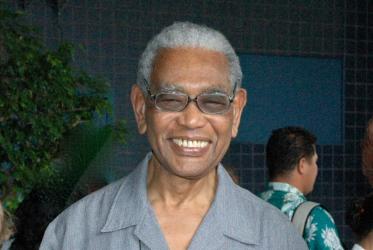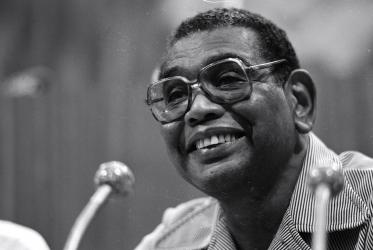Offering words of greeting at the 23 August webinar, Rev. Dr Odair Pedroso Mateus, WCC interim deputy secretary, expressed his great joy at welcoming more than 100 people in the virtual audience.
“It’s the right moment to express our gratitude and our recognition for Philip’s life and ministry,” Mateus said.
The webinar marked the 100th anniversary of Potter’s birth on 19 August 1921, and coincided with the 73rd anniversary of the WCC’s founding at its assembly in Amsterdam, which was addressed by Potter, then a student, as the spokesperson of the youth delegates.
The reflections at the webinar, moderated by Rev. Kirsty Borthwick, a PhD student at the University of Cambridge and graduate of the Ecumenical Institute Bossey (2020-21), traversed Potter’s history as well as his relevance to the struggles of the current day.
Rev. Dr Michael Jagessar, mission secretary, Caribbean and Europe regions, for the Council for World Mission, spoke about how Potter’s life and work were shaped by his birthplace of the Caribbean, and how he repeatedly pointed out the need for systemic disobedience.
“Current realities show how much he is still relevant,” said Jagessar. "Philip was a practitioner, he was a scholar, he was a catalyst.”
Many of the participants recalled meeting Potter personally and those who did not had thoughtfully read his work in such a way as to bring him to life.
Rev. Dr Annegreth Schilling, a researcher in ecumenical and intercultural theology, recalled meeting Potter when he was 85 years old yet still carried the enthusiasm and hope of youth.

Left to right: Philip Potter, Martin Luther King (USA), E. C. Blake, official visit to the WCC by Dr Martin Luther King, June 1967, Photo: WCC
“While looking at Philip Potter’s biography, we also discover the interdependence of the [global] north and south,” she said. “Philip Potter’s beginning as general secretary of the WCC in 1972 − that was a period of conflict with different world views.”
Potter was an idealist − but not naive, added Schilling. “According to Potter, the churches are called to see the local task within the total vision.”
Many agreed that the challenge of racism − a scourge Potter worked to stamp out − is still with us in a grievous way.
Dr Boudewijn Sjollema, the first director of the WCC's Programme to Combat Racism, reflected that Potter was not only his mentor in the past but still is in spirit.
“Philip was a man of the Bible; I owe him my faith,” said Sjollema. “How to relate the agenda of the churches to the agenda of the world was one of his favorite questions.”
Sjollema reflected that Potter believed we must go for life in all its fulness. “It was a time we all vividly remember,” he said. “We knew what we were doing was not to be done in isolation.”
At that time, Sjollema and others learned from Potter that they, first and foremost, had to listen to the oppressed themselves. “They were invited to express and say what they had to say about their own situation,” said Sjollema. “Some of the most powerful churches in the west became also our fiercest enemies because they feared it would cost them some of their power.”
The Programme to Combat Racism was, first and foremost, a programme to combat racism within the churches, Sjollema added. “They could only speak to the world faithfully if they put their own homes in order,” he said.
Those reflecting on Potter’s life also remembered times they spent with him personally, as well as moments when his wisdom gave them direction and new hope.
Rev. Dr Konrad Raiser, who served as WCC general secretary from 1993−2003, reflected on Potter’s belief in the importance of a dialogue of cultures.
Raiser recalled that, in 1984, when Potter left the office of WCC general secretary, his colleagues held a symposium entitled “Cultures in Dialogue.” At the conclusion of the symposium, Raiser said, Potter confirmed the choice of title.
“He said, ‘I contain in my own self many cultures from Mongolian all the way to Africa with Europe in between. I contain within my own self the oppressed and the oppressors, white and black and yellow. Therefore this dialogue of cultures has been going on all my life.’ ”
Young people joined in reflecting how Potter’s words and guidance have helped them form themselves as profound humanists. “I am deeply grateful to the WCC for the opportunity to get closer to the life of Philip Potter,” said Dianet Martínez Valdés, regional secretary of the World Christian Student Federation for Latin America and the Caribbean.
“I still have more to learn from him, and that is also why I value that we have spaces like this to learn from him,” she said. “One of many attributes given to Philip Potter I would like to highlight is that he has always been a spokesperson for youth,” she said. “Throughout his whole life and ecumenical career, he valued and also advocated for the participation of young people.”
Bishop emeritus Bärbel Wartenberg-Potter spoke affectionately of her late husband and how he maintained a sense of hope for himself and those around him. It was Wartenberg-Potter who recalled Philip Potter’s simple utterance for what the ecumenical movement should be about: “Only connect.”
Sometimes those connections bore fruit, sometimes not, she added.
“When people said that their efforts were in vain, Philip would say: ‘You can take the horse to the water but you cannot make it drink.’ A lot of water has not been drunk, but some water has been drunk. And out of this has flourished a lot of beautiful ecumenical trees and flowers,” said Wartenberg-Potter. “When things happened which we hadn’t foreseen, he would sit down and sigh and say: ‘You never finish learning.’ ”
Potter would also say that there was always room for improvement. “Friends, there is always room for improvement of the ecumenical movement, too,” said Wartenberg-Potter.
As the formal online presentation came to a close, many stayed online to share stories of their best moments with Potter, carrying out in real time the true essence of what “only connect” means to them.
Letter from WCC acting general secretary to Bishop emeritus Bärbel Wartenberg-Potter
The 2013 WCC publication, At Home with God and in the World; A Philip Potter Reader is available for free download
There is also a special free virtual issue of the WCC journals The Ecumenical Review and International Review of Mission: “Philip Potter: Prophet of God’s Oikoumene”






